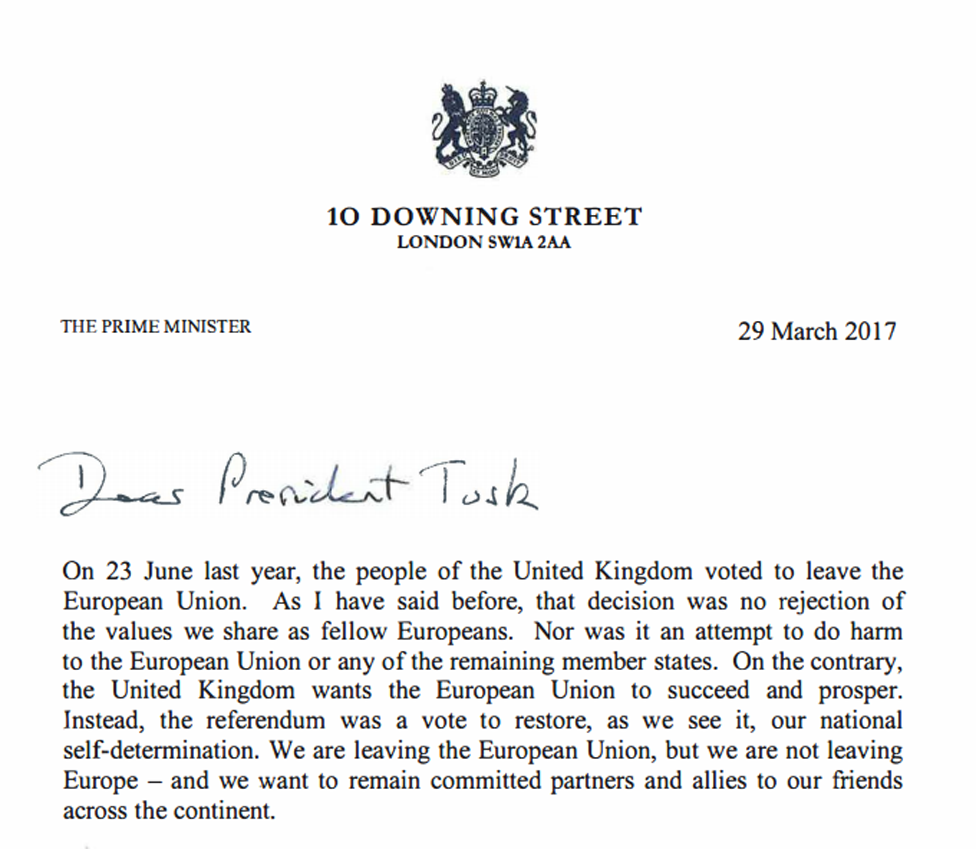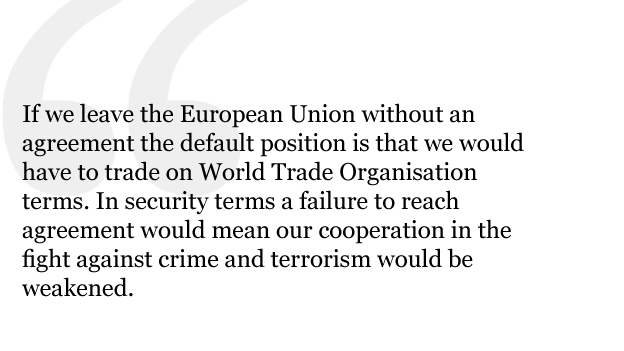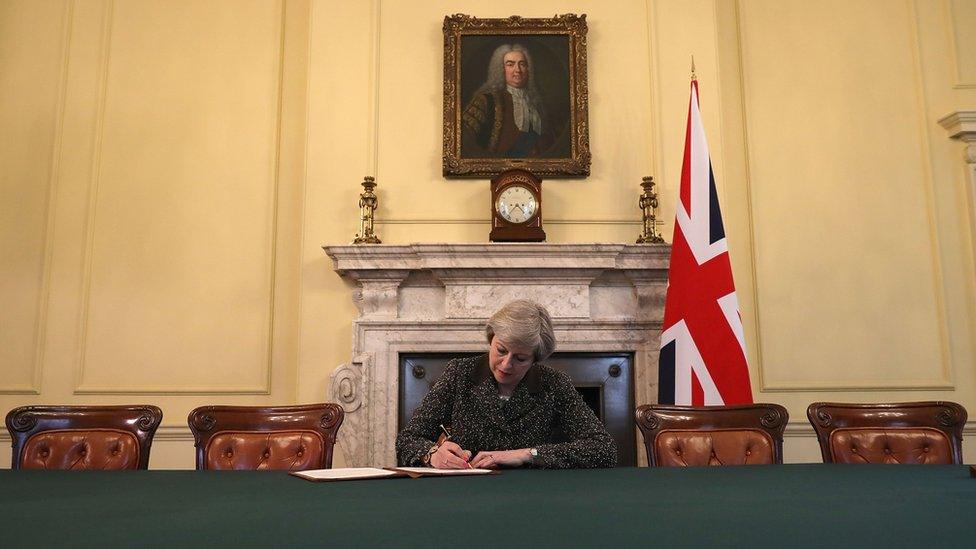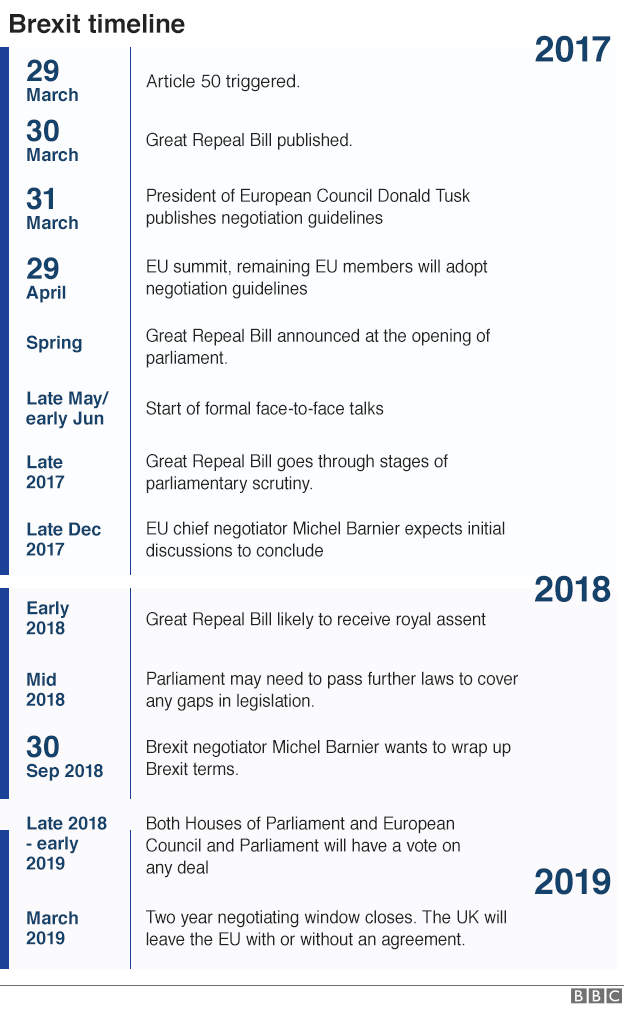'No turning back' on Brexit as Article 50 triggered
- Published
- comments
Theresa May: "This is an historic moment"
Britain's departure from the EU is "an historic moment from which there can be no turning back", Theresa May has said.
She was speaking after Britain's EU ambassador formally triggered the two year exit process by handing a letter, external to EU Council President Donald Tusk.
A sombre-looking Mr Tusk said it was not a "happy day" for him or the EU.
The European Parliament warned security cooperation was not on the table as it fired its opening salvo in what are expected to be tough negotiations.
In her letter to Mr Tusk triggering Article 50 of the Lisbon Treaty, Mrs May said failure to reach a trade deal within the two-year time limit could "weaken" cooperation in the fight against crime and terrorism.
But Guy Verhofstadt, the European Parliament's chief Brexit negotiator, said he would not accept any attempt to "bargain" between trade and security, adding: "I think the security of our citizens is far too important to start a trade off from one for the other."
Home Secretary Amber Rudd has said the UK could end intelligence-sharing with Europol, the EU policing agency, if there was no agreement.
But in an interview with the BBC's Andrew Neil, on BBC One, Mrs May said on security that she "would like to be able to maintain the degree of co-operation on these matters that we have currently".
Downing Street insisted Mrs May's comments were not intended as a threat to EU negotiators, saying it was a "simple fact" the existing arrangements would lapse if Britain left the EU without a deal.
But opposition MPs accused her of jeopardising public safety by attempting to use security co-operation as a "bargaining chip" in the forthcoming negotiations.
Theresa May discusses cross-border security
Article 50 of the Lisbon Treaty gives both sides two years to reach agreement so, unless the UK and the 27 remaining EU member states agree to extend the deadline for talks, the UK will leave on 29 March 2019, a Friday.
At a press conference in Brussels, Donald Tusk held up Mrs May's letter, saying: "We already miss you."
In a brief statement, he said it was not "a happy day" for him or for the EU and promised to begin arrangements for the UK's "orderly withdrawal".
He said the EU's aim in negotiations was "damage limitation" and to "minimise costs" for EU citizens, businesses and member states.
In a statement in the Commons, Mrs May said: "Today the government acts on the democratic will of the British people and it acts too on the clear and convincing position of this House."
Theresa May statement on Article 50
Donald Tusk: 'We miss you already'
She added: "The Article 50 process is now under way and in accordance with the wishes of the British people the United Kingdom is leaving the European Union.
"This is an historic moment from which there can be no turning back."
She said Britain would now make its own decisions and its own laws and "take control of the things that matter most to us - we are going to take this opportunity to build a stronger, fairer Britain, a country that our children and grandchildren are proud to call home".
She told MPs that this marks "the moment for the country to come together".
Mrs May said it was a "moment of celebration for some, disappointment for others" and promised to "represent every person in the whole United Kingdom" during the negotiations - including EU nationals, whose status after Brexit has yet to be settled.
She said that while the UK would remain the "best friend and neighbour" to its EU partners, it would also look beyond the borders of Europe, saying the country can "look forward with optimism and hope and to believe in the enduring power of the British spirit".
"I choose to believe in Britain and that our best days lie ahead."
A six-page letter from Mrs May triggering Article 50 was handed to European Council President Donald Tusk by the UK's ambassador to the EU Sir Tim Barrow.

Focus on May's letter to Tusk


Alex Forsyth's analysis: "In this section the prime minister is attempting to highlight the mutual benefits to both the UK and the EU of reaching an agreement about their future relationship - and warning of the dangers if that doesn't happen. It's a carrot rather than a stick, albeit one that comes with a health warning."

In a leaked draft position paper, the European Parliament, which has a final say over any deal struck with Britain, says Brexit could be revoked, despite opposition from the EU chief negotiator Michel Barnier to making references to the reversibility of the process.
It also suggests that the European Court of Justice, the EU's top court, will be the "competent authority for the interpretation and enforcement of the withdrawal agreement".
MEPs also insist that any trade deal between the UK and the EU can only be struck after Britain has left.
On the shape of a likely trade deal with the EU, Mrs May told Andrew Neil: 'What we're both looking for is that comprehensive Free Trade Agreement which gives that ability to trade freely into the European single market, and for them to trade with us.
"It will be a different relationship, but I think it can have the same benefits in terms of that free access to trade."
German Chancellor Angela Merkel has rejected Mrs May's call for negotiations on the UK's exit from the EU to run in parallel with talks on defining their future relationship.
"The negotiations must first clarify how we will disentangle our interlinked relationship... and only when this question is dealt with, can we, hopefully soon after, begin talking about our future relationship," said Mrs Merkel in Berlin.
There is also likely to be a big row over outstanding debts the UK will have to pay when it leaves. Mrs May promised a "fair settlement" - the EU wants £50bn.
Brexit direction is 'reckless' - Jeremy Corbyn
Tim Farron: Our children will judge us
There May: UK to have 'same benefits' on trade
Labour leader Jeremy Corbyn said his party would "back" Mrs May if she meets his party's tests on the Brexit deal - including full access to the single market and protection for workers' rights.
Liberal Democrat leader Tim Farron, who opposes Brexit, said Mrs May was "twisting the will of the people, leaping into the abyss without any idea of where our country will end up".
He said it was "still possible for the British people to stop a hard Brexit and keep us in the single market - and if they want, it is still possible for the British people to choose to remain in the European Union".
"It is a tragedy that Labour are helping the Conservatives in doing this damage to our country," he added.
Seven decades of the UK in Europe
The SNP accused Mrs May of breaking a promise to secure a UK-wide agreement before triggering Article 50 - and took a swipe at the prime minister's claim that "now is not the time" for another Scottish independence referendum.
The party's foreign affairs spokesman, Alex Salmond, said: "After nine months of this prime minister's approach to Brexit Northern Ireland is deadlocked, the Welsh are alienated, Scotland is going for a referendum, the English are split down the middle, and Brexit MPs are walking out of Commons committees because they don't like home truths.
"Has the prime minister considered, in terms of invoking Article 50, that 'now is not the time'?"
Negotiations with other EU nations are expected to begin in mid-May.
On Thursday the government is expected to publish details of its "Great Repeal Bill", which aims to convert EU law into domestic legislation and repeal the European Communities Act, which says EU law is supreme to the UK's.

Theresa May signs the letter to the EU confirming the UK's departure

Up for discussion
Trade: The UK will withdraw from the single market and seek a new customs arrangement and a free trade agreement with the EU
Expats: The government wants to secure an agreement with European countries "at the earliest opportunity" on the rights of EU nationals in the UK and Britons living in Europe
Brexit bill: The UK government has promised to honour its obligations as it leaves, but has brushed off claims these could run to £50bn
Northern Ireland border: Aiming for "as seamless and frictionless a border as possible between Northern Ireland and Ireland"
Sovereignty: Britain will leave the jurisdiction of the European Court of Justice but seek to set up separate resolution mechanisms for things like trade disputes
Security: The UK government has said it wants to continue to cooperate on security and intelligence-sharing
Transitional deal: An interim arrangement may be needed before the final arrangements come into force



